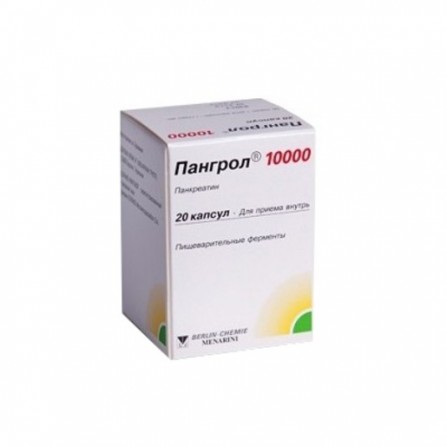Pangrol 10000 capsules 20 pcs
Condition: New product
1000 Items
Rating:
Be the first to write a review!

More info
Active ingredients
Pancreatin
Release form
Capsules
Composition
1 capsule contains: Active substance: Pancreatin 10,000 ED.
Pharmacological effect
The active ingredient of the drug Pangrol 10000 is pancreatin, which is a powder from the pancreas glands. Enzymes that are part of pancreatin, contribute to the breakdown of fats, carbohydrates and proteins from food. Pancreatin, providing a proteolytic, amylolytic and lipolytic effect, compensates for the enzymatic insufficiency of the pancreas, improves the functional state of the gastrointestinal tract, normalizes digestive processes.
Pharmacokinetics
Gelatin capsules of the drug Pangrol 10,000 quickly dissolve in the stomach, releasing mini-pills coated with an enteric (acid-resistant) coating. Thus, the enzymes remain protected from inactivation in the acidic environment of the stomach. The release form of the drug provides mixing of mini-pills with intestinal contents and uniform distribution of enzymes. Dissolution of the mini-tablet shell and enzyme activation occurs at a neutral or weakly alkaline pH in the small intestine. Pancreatin is not absorbed in the gastrointestinal tract, excreted in feces.
Indications
Pangrol is prescribed for replacement therapy in case of various genesis of exocrine pancreatic insufficiency: in chronic pancreatitis, dyspepsia, pancreathectomy, conditions after irradiation, cystic fibrosis; diarrhea of non-infectious origin, flatulence. Pangrol is used to correct disorders of food absorption (after resection of the small intestine and stomach); to improve the absorption of the hard-to-digit fatty, unaccustomed or vegetable food; with an inactive lifestyle; for violations of the functions of the chewing apparatus; with prolonged immobilization. Pangrol is prescribed for gastrocardiac syndrome (Remheld syndrome), as well as during the preparation period for radiological and other studies of the abdominal cavity for bowel degassing.
Contraindications
Pangrol is contraindicated in acute pancreatitis, in acute exacerbations of chronic pancreatitis, in case of individual hypersensitivity.
Precautionary measures
Do not exceed recommended doses.
Use during pregnancy and lactation
Clinical data on the treatment of pregnant women with preparations containing pancreatic enzymes are not available. Animal studies have not revealed absorption of pancreatic enzymes of porcine origin, therefore toxic effects on reproductive function and fetal development are not expected. Use of Pangrol 10000 during pregnancy is possible if the expected benefit to the mother exceeds the possible risk to the fetus. animal studies during which no negative effect of pancreatic enzymes was detected, no adverse effect of the drug on the baby through the breast mole is expected eye. During lactation, pancreatic enzymes can be taken.
Dosage and administration
Pangrol pills or capsules should not be chewed. It is recommended to drink them with a glass of water or juice. If necessary, a capsule containing mini-pills can be opened and the contents dissolved in a liquid. The pangrol is dosed individually, in accordance with the severity of the digestive disturbance. As a rule, the drug is prescribed before eating 1-2 capsules. (Pangrol 20 000 or 25 000) or 2-4 caps. (Pangrol 10,000). Increasing the dosage of Pangrol is possible only on prescription and depends on the severity of digestive disorders. The maximum daily dosage of enzymes for children from 12 years old and adults is 15,000–20,000 IU of lipase per 1 kg of body weight, and in case of complete exocrine insufficiency, 400,000 IU per day. Dosing Pangrol and duration of therapy in children from 3 to 12 years should be carried out by a doctor. As a rule, no more than 1,500 IU of lipase is administered per kg of baby weight. The daily dose for children up to 1.5 years is 50 thousand units, after 1.5 years - 100 thousand units.
Side effects
When taking Pangrol may cause allergic reactions of the immediate type, rarely marked disorders of the gastrointestinal tract (nausea, constipation or diarrhea, discomfort in the epigastrium). With long-term administration in high dosages, hyperuricuria may develop. When receiving high doses of Pangrol in patients with cystic fibrosis, it is possible to form strictures in the ileocecal section or in the ascending section of the colon.
Overdose
Symptoms: the use of large doses of pancreatic enzymes may be accompanied by hyperuricuria and hyperuricemia in patients with cystic fibrosis. Treatment: drug withdrawal, symptomatic therapy.
Interaction with other drugs
Interaction studies were not conducted.
special instructions
In patients with cystic fibrosis who received high doses of pancreatin preparations, the ileum, caecum and colon strictures (fibrosing colonopathy) are described. As a precautionary measure, if unusual symptoms appear or the nature of symptoms of the underlying disease changes, a medical examination is necessary to exclude colon lesions, especially if the drug is used in a dose of more than 10,000 lipase units / kg / day. Impact on the ability to drive vehicles and control mechanisms 10,000 does not affect the performance of potentially hazardous activities that require special attention and quick response.


